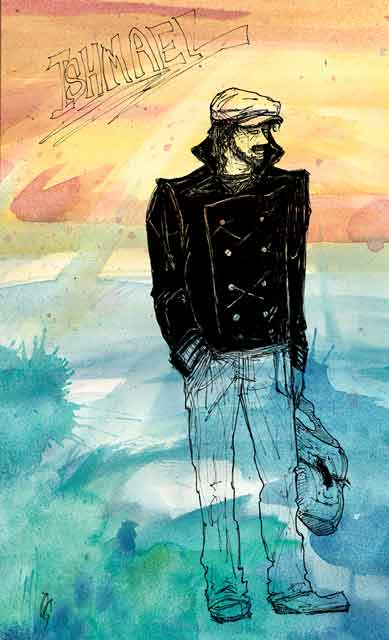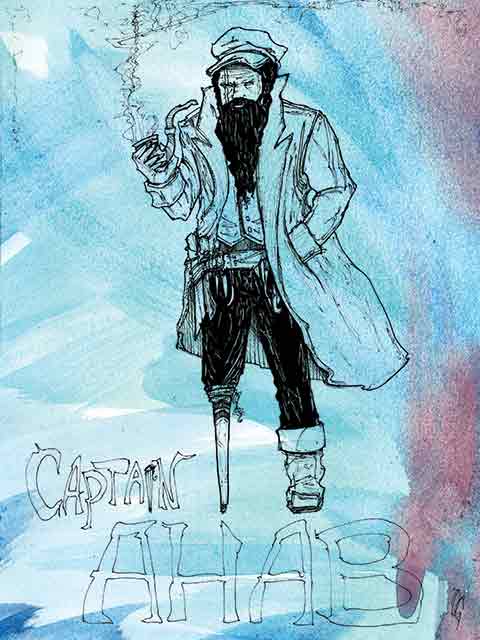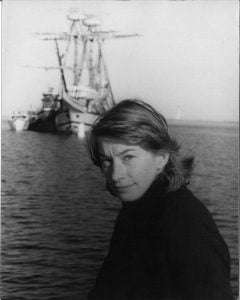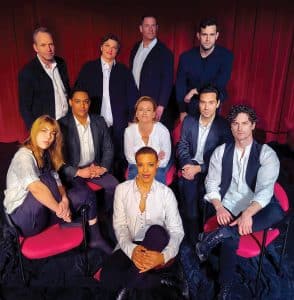by Rebecca M. Alvin
Above Image: Ahab vs. Moby by Justine Ives
If you’ve ever been on a whale watch, you know the thrill of catching a glimpse of cavorting whales, preceded by a bubbling circle of froth and, if you’re lucky, culminating in a leap above the waters. These momentary glimpses of just a portion of these aquatic mammals’ immense bodies do nothing to quell the curiosity about them. In fact, the thrill only begets more curiosity about the mysteries of these creatures who are so different from us and yet intrinsically connected to us.
Whether or not you’ve been on a whale watch, this week you’ll have an opportunity to indulge the natural curiosity about whales that comes with being here in Provincetown, with the Provincetown Public Library’s Moby-Dick Marathon Reading, (in which scores of volunteers each read a part of the Melville classic) and panel discussion on whales, whaling, and Provincetown’s past and present.

“I love the idea of doing this in Provincetown in particular, because Provincetown was a great whaling port, its people were living in a very hard way (which we now look upon as something we certainly don’t endorse). [Whaling] was a hard way to earn your money,” says Philip Hoare, curator of the Moby-Dick Big Read, whale aficionado, and a longtime Provincetown visitor. He adds, “How wonderful that Provincetown turned it around….So the same guys whose families were involved in the whaling industry now head up this extraordinary response to them. Provincetown turned around that trajectory.”
Hoare, who will participate in the From Resource to Wonder: The Whales of Provincetown —Past, Present, and Future panel at the library on Thursday, April 21, is of course referring to the Provincetown Center for Coastal Studies (PCCS) and its co-founder Dr. Charles “Stormy” Mayo. An eleventh-generation Provincetowner, Mayo’s ancestors were whalers, and so his commitment to the rescue, rehabilitation, protection, and study of these marine mammals runs deep. Mayo will join Hoare on the panel, bringing the depth of his understanding of both the town’s whaling history and the goals and successes of PCCS in the present to the discussion.
The panel also features participation from PCCS’s Coordinator of the Global Entanglement Response Network David Mattila, Provincetown naturalist and conservationist Dennis Minsky, and New Bedford Whaling Museum’s Director of Education and Science Programs Robert Rocha.
“Dissect him how I may, then, I but go skin deep; I know him not, and never will.” – from Herman Melville’s Moby-Dick
Moby-Dick is a book that enjoys tremendous acclaim and stirs the imagination of people around the world. The inspiration for Melville’s classic was the ill-fated Essex journey out of Nantucket, which itself recently received renewed interest after Hollywood director Ron Howard made a film about that whaling ship saga based on writer Nathaniel Philbrick’s book of the same title, In The Heart of the Sea. In that film, the story of the Essex is told to a young Melville as he begins to write Moby-Dick. And Moby-Dick itself has been adapted for the screen many times, never even coming close to matching the brilliance of Melville’s writing. But what captures the imagination of so many is not just the great white whale of the novel, but what real life whales signify to us.

“There’s something quite transformative and transforming about them. They have a spiritual presence, partly because of what we’ve laid upon them, but also because of our connection with them,” Hoare speculates. “We know they’re mammals like us…They are very like us, and if you catch their eye, it is almost disconcerting. In Moby-Dick it is always the eye of the whale that’s looking at you. He says, ‘I know him not and never will,’ and that’s it.”
Perhaps in the end it is simply the immense size of the whale that we find endlessly fascinating. You catch glimpses of a whale but never actually see the entire creature; it is too big to see, too big to know, and therein lies the mystery.
“They’re big, they’re potentially dangerous, but there is something else about them that is so mysterious that I think draws us in,” says Dennis Minsky. “The sperm whale has the largest brain of any animal in the world, bigger than ours. They have amazing communication, the song of the humpback whale, and on and on. And yes, they live in a medium that is hard for us to get to, so they’re mysterious. Ninety-five percent of their life is under the water…They’re like us and they’re unlike us. They don’t have mortgages, they don’t have credit cards, they don’t have belongings. All they have is each other… Their life is each other and there’s a lot of inspiration in that, a lot of things we could learn from them.”
The Moby-Dick Marathon Reading takes place April 22 – 24, check Happenings for specific times and is preceded by the From Resource to Wonder: The Whales of Provincetown —Past, Present, and Future panel on Thursday, April 21, 6 p.m. All events are free and open to the public and take place at the Provincetown Public Library, 356 Commercial St. for more information call 508.487.7094 or visit provincetownlibrary.org.

Moby-Dick Fever
A number of other whale and Moby-Dick-related events are coming up, including a new exhibition at Berta Walker Gallery in Provincetown, Thar She Blows! (April 22 – May 22), featuring work inspired by Provincetown’s whaling and fishing heritage. The opening reception is set for Friday, April 22, 6 – 9 p.m., and will be attended by readers in the Marathon Reading, Moby-Dick scholars, and artists. Through a donation from Mercedes Cab/Cape Cab, there will be shuttle service between the library and the gallery, as well, so you can participate in the Read and the opening, as well.
And coming up on Thursday, May 5 at 6 p.m. at the Truro Public Library, whale enthusiast, author, and curator of the Moby-Dick Big Read, Philip Hoare will present his film The Hunt for Moby-Dick, a feature-length BBC documentary filmed over a period of five years in Provincetown, Nantucket, New Bedford, Western Massachusetts, and the Azores. Hoare follows in Melville’s footsteps to ask how the over-arching shape and reality of the whale inspired a great work of literature, and still reflects our modern love for animals we once exploited. The screening is a benefit the Provincetown Center for Coastal Studies and the Truro Historical Society. It will be followed by a panel discussion and Q&A with Philip Hoare and other contributors.
Berta Walker Gallery is located at 208 Bradford St. in Provincetown (508.487.6411) and the Truro Public Library is located at 7 Standish Way in North Truro (508.487.1125).










